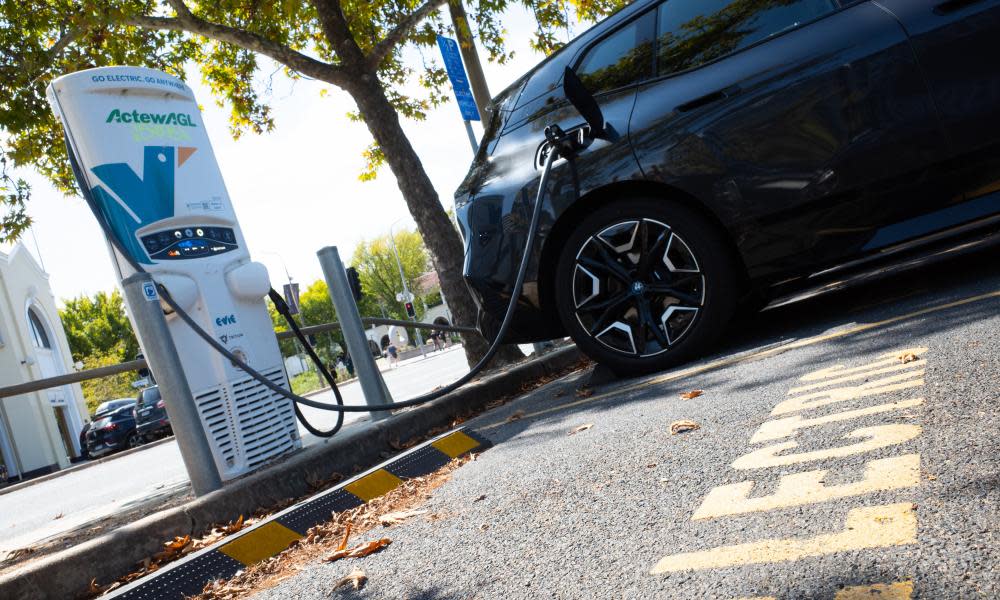ACT to incentivise electric vehicles with registration fee based on emissions rather than weight

Motorists in Canberra will soon pay their registration fees based on their vehicle’s emissions output rather than its weight, as authorities seek to further incentivise electric and less-polluting cars.
Details of the Australian Capital Territory’s transition to an emissions-based rego system were released this week as the International Monetary Fund called on Australia to explore ways to financially discourage the purchase of high-emissions vehicles and use the funds raised to further subsidise electric vehicle uptake.
The ACT government expects about 96% of passenger vehicle owners to pay the same or lower costs under the new pricing model, with the 4% facing higher costs to be owners of more-polluting vehicles.
While electric vehicle owners stand to benefit the most from the changes, the new scheme also favours less-polluting fuel-burning vehicles over petrol-guzzling alternatives.
Utes and other work vehicles will pay the same fees under the new scheme, but some low-emissions utility vehicles will become cheaper to register.
The update addresses a disparity in the existing weight-based system, where owners of cleaner but traditionally heavier electric cars were facing higher registration costs than drivers of high-polluting but less heavy combustion engine cars.
Related: Summer holidays see people queuing to charge electric cars for first time in Australia
The new pricing scheme will come into full effect from 1 July 2024, however owners of new and used electric vehicles who have enjoyed two years of free registration as part of a previous incentive initiative will be the first to move into the lowest fee category when their rego expires on 25 May this year.
Announcing details of the new system, the ACT chief minister, Andrew Barr, noted transport contributes more than 60% of the Territory’s emissions, with private vehicles responsible for roughly 70% of that category.
“Transport is now the single largest contributor to the ACT’s greenhouse gas emissions,” Barr said, adding the changes will minimise cost of living pressures.
“These new initiatives are designed to ensure we have an appropriate vehicle registration system for the future. They will see lower fees for lower-emission vehicles, including for lower-emitting petrol and diesel vehicles.”
The ACT’s energy minister, Shane Rattenbury, said zero emissions vehicles’ registrations doubled from 2021 to 2022. “The ACT is already leading the nation on electric vehicle uptake, with 9.5% of all new cars purchased in the ACT in 2022 being electric vehicles.”
The ACT’s announcement pre-empted an IMF report calling on the Australian government to explore such initiatives.
In its annual analysis of Australia’s economy, the IMF noted the ambitious task ahead of the country to meet its 2050 net zero commitments.
The report states that introducing an economy-wide carbon price would be “the most effective way to achieve emission reductions”, but acknowledges the “politically challenging” nature of achieve this.
If a price on carbon proves politically untenable, the IMF has called on the Albanese government to pursue sector-specific policies – specifically a “feebate” system to incentivise a transition to cleaner vehicle use by subsidising lower-emission vehicles and taxing higher-emission vehicles in a way that is “integrated into the vehicle registration tax system”.
The report said this would work to trigger “behavioural responses to decarbonise the vehicle fleet while avoiding a fiscal cost to the government and not raising average car prices”.
The IMF report notes similar systems have been effective in boosting electric vehicle uptake in the Netherlands and New Zealand.
The ACT’s announcement stands in contrast to a New South Wales government plan unveiled last week to offer drivers the chance to buy carbon offsets when they renew their car registration, in what was ridiculed by critics as a “gimmick” that could undermine efforts to cut transport emissions.

 Yahoo News
Yahoo News 
